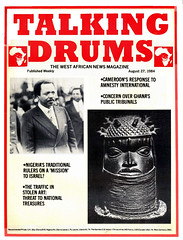Cameroon's response to Amnesty International
from Jerome F. Gwellem in Limbe
Following the abortive coup d'etat of April 6 there have been reports of executions of people implicated in the bloody uprising. Amnesty International's observations on the alleged executions are vigorously denied in the Cameroon Government statement which was first published in The Cameroon Tribune of August 8.The Cameroon government has refuted a statement sent by telex by the London-based Amnesty Inter- national (AI) which alleged that 120 people had been recently executed after the abortive coup of 6 April.
The statement, released by the Ministry of Information and Culture in Yaounde, and published by the Cameroon Tribune, described as 'unacceptable' 'discourteous and 'contemptuous' for a private organisation to address a head of state of a sovereign state by telex.
Radio Cameroon's commentators in a Sunday programme 'Cameroon Report' wondered why AI failed to raise a finger against the perpetrators of the 6 April plot. Where was Amnesty International when the former regime clamped opponents in jails, some going blind and others dying? This is the full text of the statement from the Cameroon Government:
"During the week of July 30 to August 4, 1984, some media with wide readership of audience made mention of correspondence addressed by Amnesty International to His Excellency Paul Biya asking him to give a public account of the evolution of the trial of the promoters of the attempted coup d'etat of 6 April, 1984. The said media went on to say that more than one hundred persons were executed following the judgement of the Republican Guard mutineers and their accomplices.
"Seen from a purely formal perspective, this correspondence sent by telex and made public by a private body addressing the Head of a Sovereign state, shows an unacceptable, discourteous and contemptuous attitude which the authorities of Amnesty International can hardly adopt except towards Third World Countries. What's worse, it portrays an unforgivable ignorance of the causes and consequences of the sad events of 6 April. "As regards the legal ground on which Amnesty International claims to base itself, the steps proceed from complete ignorance of internationally recognized principles of law. As a matter of fact, the President of the Republic, who is the Head of the Executive, is not bound to give an account of the evolution of legal procedures, by reason of the principle of the separation of powers.
"Obviously, after the failure of the attempted coup d'etat of 6 April, the President of the Republic announced that its promoters would be brought before the competent law courts; and this was done. It was however not for him, by virtue of this principle of separation of powers, to give an account to public opinion, be it international, on the evolution of these proceedings.
"Justice and the defence of humanitarian values have their demands. No one is allowed to be ignorant of these demands; not even Amnesty International.""Moreover in cases of attack on the security of the State Cameroon law, which is many years old and which was neither enacted for the circumstance nor has been amended since 6 November 1982, was widely applied before 6 April 1984 without any recriminations from Amnesty International. It is therefore shocking that this body which has shown interest in Cameroon for a long time, should be so little informed as to be unaware that court judgements passed in such cases cannot be appealed and that for reasons of public law and order the court can decide to hear such cases or even common law cases in camera.
"Regarding the vulgar insinuations of torture brandished by this organisation for the defence of human rights, need we remind these eminent jurists that in Cameroon justice as in any respectful justice, confession does not constitute the only mode of proof accepted in Penal Law, since the court hearing the case can establish facts by all other legal means? And these facts, as regards the 6th April 1984 coup attempt, are so well established that it is not necessary to extract confession by torture.
"Finally, it is astonishing that Amnesty International has not deemed it necessary to take sides, in the name of the humanitarian values it defends, in the crime committed by the promoters of the coup, a crime which caused considerable human and material damage, a crime teleguided by some (and by no means the least), whe are moving freely the world over with the absolute, silent complicity of the same humanitarian organisations which seem to take pleasure in pursuing with anger, not those people guilty of crimes against humanity, but those very ones who try to restore law and order by punishing criminals as is to be expected.
“Justice and the defence of humanitarian values have their demands. No one is allowed to be ignorant of these demands; not even Amnesty International."
